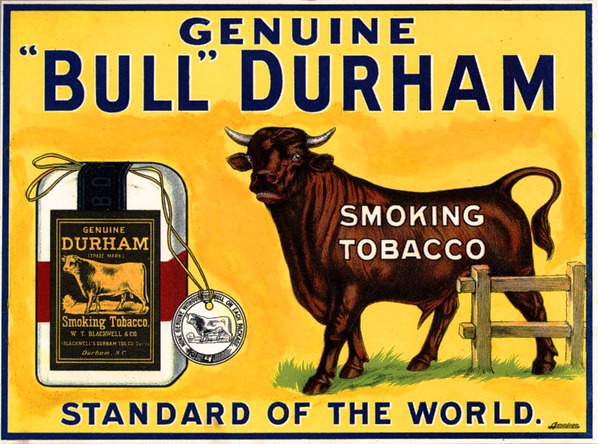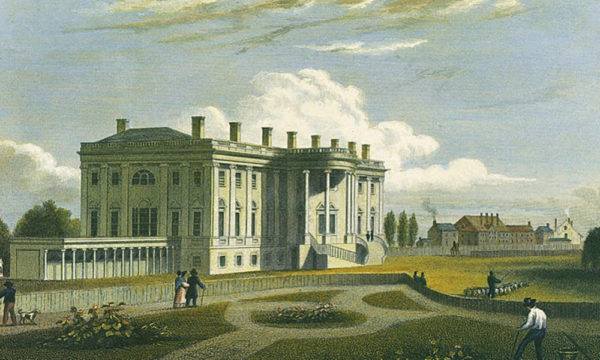Cotton and tobacco. For years those two agricultural products were as synonymous with the South as sweet tea and grits. Cotton still is, but tobacco has fallen out of favor, though Southerners still love it and use tobacco products in greater numbers per capita than any other people in America.
Tobacco, not cotton, was king in Virginia throughout much of its history. Virginians settled debts with the weed and every important Virginian in the founding generation grew tobacco. It was a staple of life, the major source of economic gain in the tidewater region of the State, and a source of great pain when the plant wore out the soil. Tobacco led John Taylor of Caroline to write the first American treatise on agriculture, Arator, in 1813. Tobacco allowed the Virginia gentry to develop into the greatest political class America has known. Perhaps that is partly why modern progressives hate it. “Big Tobacco” is synonymous with racism, slavery, poor health, and white manism. Expunge tobacco from American history and the greatest generation in American history—early federal Virginia farmers—are relegated to the dustbin of the past, if they are not already.
The plant also partially led to the development of the so-called “New South,” this time through the manufacture of chewing tobacco and machine rolled cigarettes. C. Vann Woodward argued in his Origins of the New South that men like Richard J. Reynolds, James B. Duke, and William T. Blackwell personified the dichotomy between the Old South and the New. To Woodward, these men were as much progressive captains of industry as their Northern counterparts in New York or Boston. This is one of many things he got wrong. These tobacco entrepreneurs made millions, but each man was rooted in the Southern tradition. Tobacco came from the earth, the farm, and the South, and they all knew it. The tobacco industry is more accurately the continuity between the Old South and the New, if such a thing existed until the late 20th century. When men are still more interested in the auction price of bright leaf than the stock ticker at Wall Street, the Old South still lives.
The tobacco industry employed thousands of Southerners, both white and black, even at the height of Jim Crow in the 1890s. One recent historian complained that Richard Reynolds did not do enough to alleviate racial strife in the South, nor did he advocate for black Southerners, many of whom worked in his factories. That says it all. Reynolds could have refused to employ blacks, but simply by providing jobs and allowing them to leave the shackles of sharecropping was a vast economic improvement. And both James B. Duke and his father, George Washington Duke, were revered in the black community for their philanthropy around Durham, North Carolina. The American Tobacco Company, led by the Duke family, was perhaps the first American “monopoly,” and the money that poured into North Carolina led to improvements in education, public works, and jobs. “Big tobacco” did that. Blackwell’s “Bull Durham” tobacco brand took off after the War because Yankees stole much of his product when they sacked Durham in 1865. After they went back North, they kept requesting it. They could only stuff so much in their pockets. Now, Blackwell was stuffing his with Yankee greenbacks.
Incidentally, Washington Duke had opposed slavery before the War and was conscripted into the Confederate Navy. Richard Reynolds was too young to serve, but his brother did, and according to family lore, young Richard hid the family horses from the invading Yankees near the end of the War. “Big tobacco,” like other Southern industries, found its origins in the Confederate experience, or more accurately the Southern experience. For most of American history, anything worthwhile in American culture was synonymous with Southern culture. That only changed after the War.
At the very least, Southerners should appreciate the contributions tobacco has made to the South, both before and after the War. After all, America, the real America of Jefferson, Washington, Madison, Henry, and the birth of real republicanism and American culture in Virginia, had its roots in fire-cured dark leaf. Indeed, the first permanent English colony in America, Jamestown, would not have survived without it.
Tobacco farms are slowly fading in the South. Kentucky still has several large operations, as does Maryland, North Carolina, and Virginia, but nowhere near the number that existed even half-a-century ago. No one any longer disputes that tobacco is unhealthy, but there has always been a certain American allure to the product. It was long considered masculine to use tobacco and still is among cigar smokers. Yet, even that industry is now under attack.
Since the 1990s, Americans, Southerners included, have been lining up to sue the tobacco industry. Just look at the $23 billion an Escambia County, Florida jury recently awarded to the widow of a life-long smoker. He didn’t know cigarettes were harmful. And Grant was a better general than Lee. Or perhaps he missed the 1604 memo from King James on the harmful effects of smoking, from yellow teeth and bad breath, to chronic coughing and disease of the brain. Maybe that document could be used by tobacco company attorneys as evidence for the known health dangers. It’s only been around for four hundred years. Of course, “Big Tobacco” has deep pockets and lawyers love to litigate. It isn’t their money. We know it’s bad, but as Jerry Reed sang, many just say “I’ll have another puff.”







